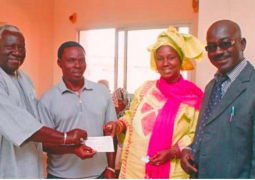Subjective evidence seems to indicate that youth participation in political processes in The Gambia is low as many young people who have acquired voter’s card do not like to vote, while many do not even know their National Assembly members and some feel most MPs “are not representing their interests”.
It is argued that most political parties in the country, with the exception of few, lack effective and active youth wings. The experience today in many African countries is the low levels of civil involvement and political apathy, which remains a dominant feature among young people.
African youth have only been marginally involved in decision-making and therefore need to be fully engaged if Africa’s development challenges are to be fully addressed.
However, in The Gambia, the status quo seems to be changing a little bit, especially in 2012, when President Yahya Jammeh nominated more young people into the National Assembly and in some instances we have also seen some young people who have contested elections and won. But this is not enough!
One key factor in democratic politics is that citizens must become accustomed to participating in political processes through political institutions, civil society, political parties, the act of voting, expression of opinion between and during elections, making regular contacts with elected representatives, etc.
The opportunities and mechanisms for effective participation remain a challenge for young people, as conscious, active citizens participating in political processes.
It is a danger to democracy that young people are not considered, directly or indirectly, as anything other than a liability to democracy. Young people are, in many ways, under siege: marginalized by male adults and the elderly from decision-making processes, faced with the HIV/AIDS epidemic, unemployment, while blamed for the increasing level of crime and violence.
Unless citizens, especially young people, have faith in democratic institutions and unless they engage in large numbers with the various processes of self-governance, democracy might end up not effectively working.
It is against this backdrop that Beakanyang, a youth-led organisation in organising the 1st National Youth Conference on Youth Participation in Politics and Decision-making process in The Gambia.
To be held at Tango Conference Hall in Kanifing on Saturday 2 June 2012, the conference aimed at further questioning the causes of youth voter apathy in elections and promotes effective youth participation in matters affecting their lives.
The meeting will bring together representatives of active national youth organizations, political parties and young parliamentarians to share their reflections on these factors as well as sound, realistic and pragmatic strategies to promote youth participation.
Specifically the conference will among other things promote effective youth participation in politics and decision-making process in the country, to educate the youth about the political history of The Gambia.
It also seeks to facilitate advocacy and the building of a common understanding for increased representation in elected positions in the country and to educate youth on the linkage between.
The conference will be held on the theme: Putting Youth at the Centre of Decision-making Process
Funded by the British High Commission in Banjul, the youth conference will start with a plenary session where prominent speakers will provide a general background and history on youth participation in Gambian politics.
This session will be followed by presentations on the status of youth participation: challenges and opportunities and why youth participation matters.
Later in the day, a panel discussion will also be held on the topic: Causes of Youth Apathy.
At the end of the conference, participants will produce a set of recommendations on how to enhance effective youth participation in politics and decision-making processes in the country, which will be handed over to the government and other stakeholders for consideration.


